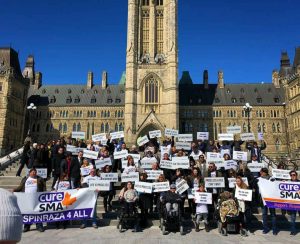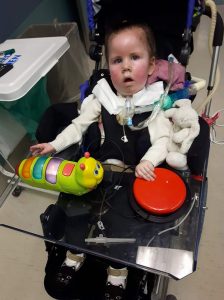Local mother marches in Ottawa for life-saving meds for Spinal Muscular Atrophy patients

Parents and Caregivers from across Canada rallied in Ottawa this week for Spinal Muscular Atrophy. Photo courtesy Hope for Lilah Facebook page.
One local mother of a two-year-old child with Spinal Muscular Atrophy Type 1 marched on Parliament Hill this past week.
The message: make life-saving medications accessible for all patients who suffer from SMA, a neuro-muscular disease, affecting the spinal cord and all the involuntary muscles.
Nicole Lamont, whose daughter Lilah was given only one to two years to live, recalls how her daughter was on a steady decline. Lamont now advocates for others who suffer from SMA and who do not have access to Spinraza, a life-saving drug that has been approved by Health Canada for all types of SMA.
“(Lilah) could only wiggle her fingers, she had nothing and she was wasting away and starting to lose her facial features and her muscles. Eventually, her lungs fully collapsed and it started affecting her breathing. Now she is on the ventilator 24/7,” said Lamont. “We were in the hospital for 208 days, she had four pneumonias.”
Lilah, who recently celebrated her second birthday, is currently receiving special access to the first treatment available for SMA following the cancelation of a trial in August. The trial was stopped early because the patients were doing so well. She has had seven injections so far since October, with her eighth treatment coming up in April.
“Since Spinraza, she’s been in the hospital only three times for illnesses, neither pneumonia-based. She now has the ability to cough, is able to start rolling over, she’s holding her head up on her own for small periods of time and she can breathe on her own for 15 minutes,” said Lamont. “It’s just been amazing to watch her improve rather than decline.
“I don’t think she would be here, if she didn’t have Spinraza,” said Lamont.
The rarity of this disease means that Lamont is the only mother she knows of in Windsor presently caring for a child with SMA Type 1. Knowing first-hand what this drug can do, Lamont independently made her way to Ottawa where she marched in solidarity with more than 60 parents and caregivers from all over Canada, urging Members of Parliament to write letters requesting that the life-saving drug be more accessible, specifically for patients with Type 2, 3 and 4 SMA.
So why isn’t a life-saving drug that has been approved by Health Canada for all types of the disease accessible by all patients?
“CADTH (Canadian Agency for Drugs and Technologies in Health) only recommended reimbursement for a small subset of Type 1 patients … This leaves the vast majority of patients affected by SMA without treatment,” said Susi Vanderwyk, executive director of Cure SMA Canada.
Lamont rallies on behalf of the majority of SMA patients who cannot get access to this treatment. “How can they say that their child’s life isn’t worth the access to this treatment?”

Photo courtesy of Hope for Lilah Facebook page.
Parents of children with rare diseases know the struggle of bringing awareness to their disease and getting funded for research.
“Every day that passes without access to treatment equates loss of life and ability. The provincial government needs to right the wrong and open access immediately,” said Vanderwyk.
Advocates believe it is unacceptable that Canada is able to leave a group affected by a life limiting disease without access to the only treatment ever developed for their disease.
On the heels of the Ottawa rally, Lamont is now busy planning the 2nd Annual Walk-A-Thon for Hope for Lilah to take place April 8 at Malden Park. Funds raised at the event this year will go towards necessary home renovations for Lilah, specialized equipment such as a hospital bed, special mattress, bath seat and medical supplies. In addition, 50 per cent of funds raised will go to Cure SMA Canada for research.


